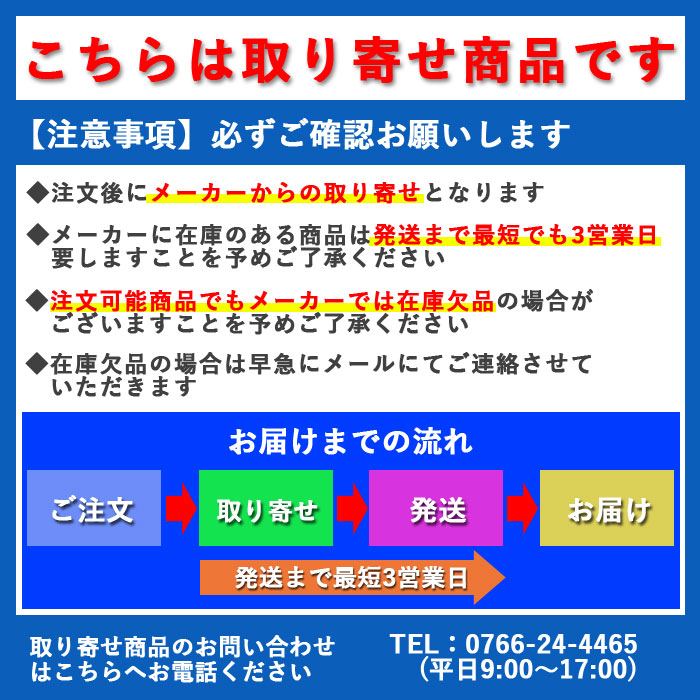- 当日発送
- 送料無料
作業服 春夏用 藤和 TS DESIGN 上下セット 55306 TSXTECライトクロスニッカーズロングスリーブシャツジャケットS~3L と 55304 TSXTECライトクロスメンズニッカーズカーキグリーン S~3L 作業着 作業ズボン|作業服・空調服・防寒着キンショウ ズボン・パンツ 新作専門店!
- 販売価格 :
-
¥8,316税込
- 獲得ポイント :
- 344ポイント
当日発送可 (14:00までのご注文が対象)
- ※
ご注文内容・出荷状況によっては当日発送できない場合もございます。
詳しくはこちらよりご確認ください。
利用可
- ※
ポストにお届け / 一点のみ購入でご利用可能です。
ゆうパケットでのお届けの場合はサンプル・ノベルティが対象外となります。
ゆうパケットには破損・紛失の保証はございません。
詳しくはこちらよりご確認ください。
商品の詳細



COLOR カラー




DETAIL 商品詳細


SIZE サイズ

SERIES シリーズ
- ご利用のパソコン環境によって、実物と色合いがやや異なって見えることがあります。
- 同メーカーの同じ色名でも、シリーズが違うと色合いが異なる場合があります。上下でご購入の場合は、同シリーズの商品よりお選びください。
- ページ内の情報はカタログ初出時のものです。予告なく商品仕様・細部名称の変更がある場合があります。
 55306 TSXTECライトクロスニッカーズロングスリーブシャツジャケット
55306 TSXTECライトクロスニッカーズロングスリーブシャツジャケット  55304 TSXTECライトクロスメンズニッカーズカーキグリーン
55304 TSXTECライトクロスメンズニッカーズカーキグリーン 
商品は全てメーカーよりお取り寄せ致します。ご注文欄の表示に関わらず、在庫欠品している場合がございます。
CUSTOMIZE カスタマイズ


INFOMATION インフォメーション



商品仕様・説明
【55306 TSXTECライトクロスニッカーズロングスリーブシャツジャケット】
◇メーカー:藤和 TS DESIGN TS DESIGN
◇春夏用
◇素材:TSクロステックライトクロス ポリエステル73% 綿20% 麻7%
◇機能:軽量・ストレッチ・形態安定性・2層構造糸・安心の日本製素材使用・マルチスリーブポケット
◇サイズ:S・M・L・LL・3L・4L・5L・6L
◇カラー:アイイロ・トビイロ・スミイロ
【詳細】
◇カバーオール感覚で着用できるニッカーズの夏スタイル。
◇日本特有の風合いと深みのある色合い×テクノロジーの融合。
◇TS独自開発のTSクロステックライトクロスは吸汗速乾性・ドライに特化した素材と天然繊維(綿・朝)を使用









商品の説明

orSlow / オアスロウ : M-52 FRENCH ARMY TROUSER (WIDE FIT) : フレンチ アーミー トラウザー ワイドフィット カジュアルパンツ ボタンフライ スラッシュポケット メンズ : 03-5252-72【STD】|ARKnets

【中古】TEATORA WALLET PANTS HORIZON ウォレットパンツ ネイビー サイズ:4 【170322】(テアトラ)|ブランド古着のカインドオル

BARNSTORMER(バーンストーマー) 1333P DRESS FATIGUE PANTS(ドレスファティーグパンツ) HERRINGBONE(ヘリンボーン) OLIVE(068)|SELECT STORE SEPTIS
![児島ジーンズ スリム (KOJIMA GENES) ケブラー ジーンズ [RNB-1017NS] 13oz デニム ダブルニー ワークパンツ 細め (日本製/岡山/児島/ジーンズ/バイカー/Gパン/KOJIMA JEANS/RNB1017NS)|FRISBEE](https://tshop.r10s.jp/frisbee/cabinet/kojima_genes/101mbrnb-1017ns-9-i.jpg)
児島ジーンズ スリム (KOJIMA GENES) ケブラー ジーンズ [RNB-1017NS] 13oz デニム ダブルニー ワークパンツ 細め (日本製/岡山/児島/ジーンズ/バイカー/Gパン/KOJIMA JEANS/RNB1017NS)|FRISBEE

THE REAL McCOY'S リアルマッコイズ パンツ Lot.002 Leeタイプ カウボーイ デニムパンツ MP17104 19SS インディゴ 31 ボトムス ジーンズ ジーパン 【メンズ】【中古】【美品】【K3297】|ブランド古着のBEEGLE by Boo-Bee

Eight-G(エイトG)“ルーズストレート” NO.803-RD2-KINGリアルダメージ加工キングサイズ(40・42インチ)EG-803-RD2-KING「P」ジーンズ メンズ ストレート アメカジ デニム 男性|Gパン屋のFUJIYAMA
![[秋冬] ダークマドラスフラノ 0930 ( イン2タックパンツ ) ( スラックス/パンツ/ズボン/ボトム )|トラッド ハウス フクスミ](https://tshop.r10s.jp/fukusumi/cabinet/00740864/06681401/0930in2a.jpg)
[秋冬] ダークマドラスフラノ 0930 ( イン2タックパンツ ) ( スラックス/パンツ/ズボン/ボトム )|トラッド ハウス フクスミ

【STUDIO D'ARTISAN】ステュディオダルチザン SP-053 クレイジージーンズ デニム 40thスヴィンゴールド ブルー スタジオダルチザン【中古】FB2685|リサイクルストア エコライフ
![【男女サイズあり】graphzero(グラフゼロ) 16オンスセルビッチ 裏ヒッコリーストレートジーンズ ワンウォッシュ メンズ・レディース [GZ-16ST-01-HC-OW] 岡山 倉敷 児島 ジーンズ デニム ブランド ヘビーオンス ジーパン デニムパンツ 児島製 日本製|クラフトカフェ](https://tshop.r10s.jp/gold/craftcafe/images/graphzero/gz-16st-01-hc-ow-main.jpg)
【男女サイズあり】graphzero(グラフゼロ) 16オンスセルビッチ 裏ヒッコリーストレートジーンズ ワンウォッシュ メンズ・レディース [GZ-16ST-01-HC-OW] 岡山 倉敷 児島 ジーンズ デニム ブランド ヘビーオンス ジーパン デニムパンツ 児島製 日本製|クラフトカフェ

glamb グラム Windowpane Easy Pants ウィンドウペーンイージーパンツ パンツ 送料無料|ARTIF
最新のクチコミ
ふわふわで触った時も履いた時も気持ちよく、子供が凄く気に入っています。ずっと履いていたいみたいです(笑)アンパンマン好きにはオススメです!
- okc*****さん
- 42歳
- アトピー
- クチコミ投稿 3件
購入品
かわいいです!生地もしっかりしていて子どもも喜んでいます
- byj*****さん
- 60歳
- アトピー
- クチコミ投稿 4件
購入品
仕立てが良く、サイズ表示も適切で自分に合ったコートを購入することができました。妻も『購入金額より高価に見える』と好評価でした。
- lnd*****さん
- 27歳
- アトピー
- クチコミ投稿 5件
購入品
ネイビーはチャック周辺の色落ちが早く、同色の服染ペイントを購入して何度も塗りましたが、いつも汚れた感じがするので数ヶ月で廃棄しました。
- ajz*****さん
- 28歳
- アトピー
- クチコミ投稿 1件
購入品
乾燥でバサバサし広がる髪質でしたがこの商品に感動しました。ロングヘアーでオイルがないとまとまらず結ぶ事が多かったのですが濡れた髪にスプレーして乾かすだけでサラサラになりました^_^もっと早く出会いたかった程の一押し商品です。
- asr*****さん
- 50歳
- アトピー
- クチコミ投稿 4件
購入品
配送も早く値段も安い気がするのでよかったです!子供が扁平足なのでアシックスを勧められて何足か買っています!子供も気に入ってるようでよかったです!
- uwx*****さん
- 64歳
- アトピー
- クチコミ投稿 2件
購入品
想像した色のちょっと違いましたが可愛かったです!
- bse*****さん
- 59歳
- アトピー
- クチコミ投稿 3件
購入品
歯ブラシを噛んでしまい、すぐダメになってしまう子供に購入しました。迅速に届いて梱包も問題ありません。早速使い、最初は怖がってましたが、少しずつあててみたら自分からやるようになりました。替ブラシが付いてて、お得感もあって良かったです(^^)
- tyl*****さん
- 53歳
- アトピー
- クチコミ投稿 1件
購入品
とにかく安い。ありがたいことです。いつもまとめ買いさせてもらっていますが、配送も早く、他ではもう変えません。
- cjq*****さん
- 53歳
- アトピー
- クチコミ投稿 1件
購入品
持つ所がまっすぐではないので、どうかな?と思っておりましたが、私が想像していたよりも使いごこちがよかったです。漆ぬりもつやつやで見た目も良かったです。
- jcn*****さん
- 46歳
- アトピー
- クチコミ投稿 3件
購入品
2019年1月に自分たち用に初めて購入しました。肩こり・腰痛がひどく時々ギックリ腰になっていたので、その対策に購入しました。今までこういった腰痛対策用を購入したことはなく、他のメーカーとの比較はできませんが、9ヵ月ほど使用してみてなかなか良いと思っています。夫は、仕事で腰を痛めてしまっても、翌朝には回復してもう痛くないと言います。私は、肩こり・腰痛の症状がひどく、整体に行っているので敷布団の効果はよくわかりませんでした。しかし、先日実家の農業の手伝いで泊まった時に実感しました。実家の敷布団で寝たら、目覚めが悪く身体の痛みが残ってしまいいつもの寝起きとは違いました。加えて農業でさらに身体を痛めたので、ズキズキとした痛みがある状態で自宅に帰り寝たところ、翌朝その痛みが回復し、スムーズに身体を動かせることに感動しました。すぐに、痛みと疲れに悩んでいる両親のために同じものを購入しました。何十年も敷布団を買い替えずに使って来たため、敷布団の効果に半信半疑ですが、寝心地は気に入ってもらえたようです。腰痛が完全に治るわけではないけど、回復を手助けしてくれてると感じました。気持ちよく起きれて最高です。
- puk*****さん
- 64歳
- アトピー
- クチコミ投稿 3件
購入品
大きさについては大小入混ざっていますが表皮はそれほど汚いものはありませんでした。全部で33個で小さめの方が多く食べられないような物はなかったです。味は可もなく不可もありません。甘夏特有の甘味、酸味、苦味があり普通に美味しいです。早朝に注文したら午前中に出荷準備中の連絡があり当日に出荷してもらえました。対応はすこぶる良好です。リピート予定です。
- vty*****さん
- 55歳
- アトピー
- クチコミ投稿 5件
購入品
さすがLサイズ大きくて驚きました。いい仕事をしてくれますね。直ぐに水槽のガラスにへばりついていました。
- fuo*****さん
- 33歳
- アトピー
- クチコミ投稿 5件
購入品
とても元気な個体で到着後、温度、水合わせをして水槽投入しましたところライブロックの清掃を始めてくれました。また梱包や冬場の保温対策をしっかりして頂いておりリピさせていただき正解でした。
- bpd*****さん
- 33歳
- アトピー
- クチコミ投稿 1件
購入品
縦長のコンパクトな容器に約43回分の酸素系漂白剤がはいっています。冬場部屋干しする際に気になる生乾き臭を抑えてくれる点と場所をとらない というだけで、リピ買いしています。少量で効果を得られ、価格も安く普段使いに最適だと思います。
- dkh*****さん
- 64歳
- アトピー
- クチコミ投稿 3件
購入品
うちの猫の大のお気に入りです。爪とぎにも使いますが、大きさがちょうどいいのか、よく丸まってくつろいでいます。爪とぎ部分が交換できるので助かります。
- mwh*****さん
- 41歳
- アトピー
- クチコミ投稿 1件
購入品
膀胱炎になってしまった飼い猫のために購入しました。よく食べてくれるので、こちらのフードを何度か購入しています。動物病院で買っていた時よりお手頃価格で助かります。フードをこちらにしてからは飼い猫の体調も悪化していないので良かったです。
- xpk*****さん
- 44歳
- アトピー
- クチコミ投稿 3件
購入品
とても完成度が高く、満足しています。少しズボンがお尻に食い込みます(笑)
- yje*****さん
- 42歳
- アトピー
- クチコミ投稿 2件
購入品










![[即完] FALILV by FaLiLV グラフィックロンT](https://img.fril.jp/img/626078858/l/2001325658.png)